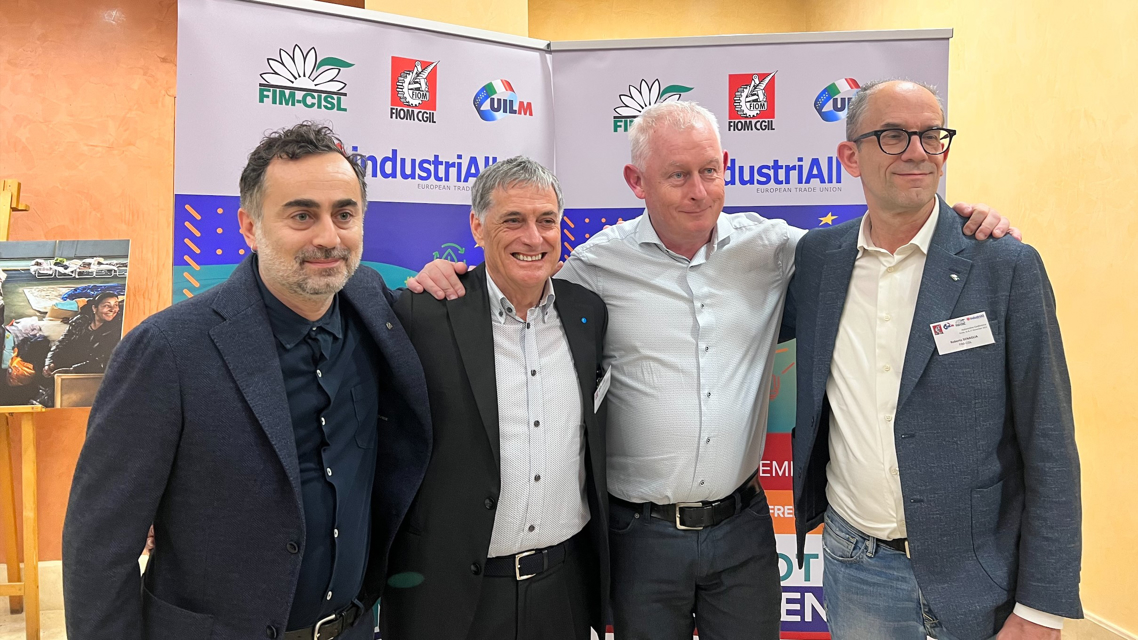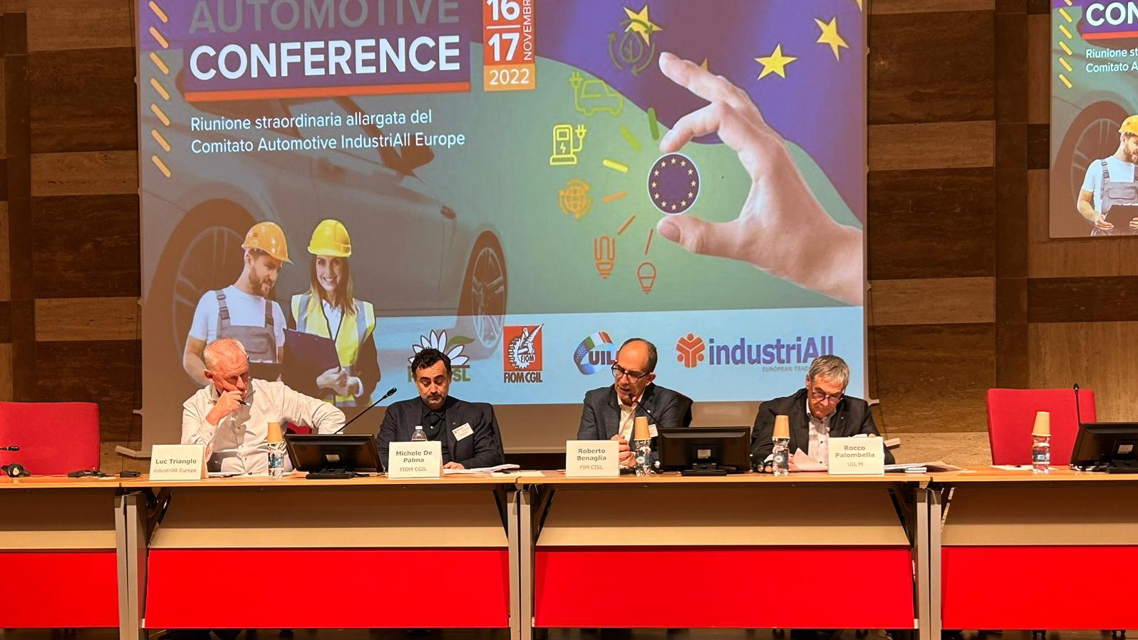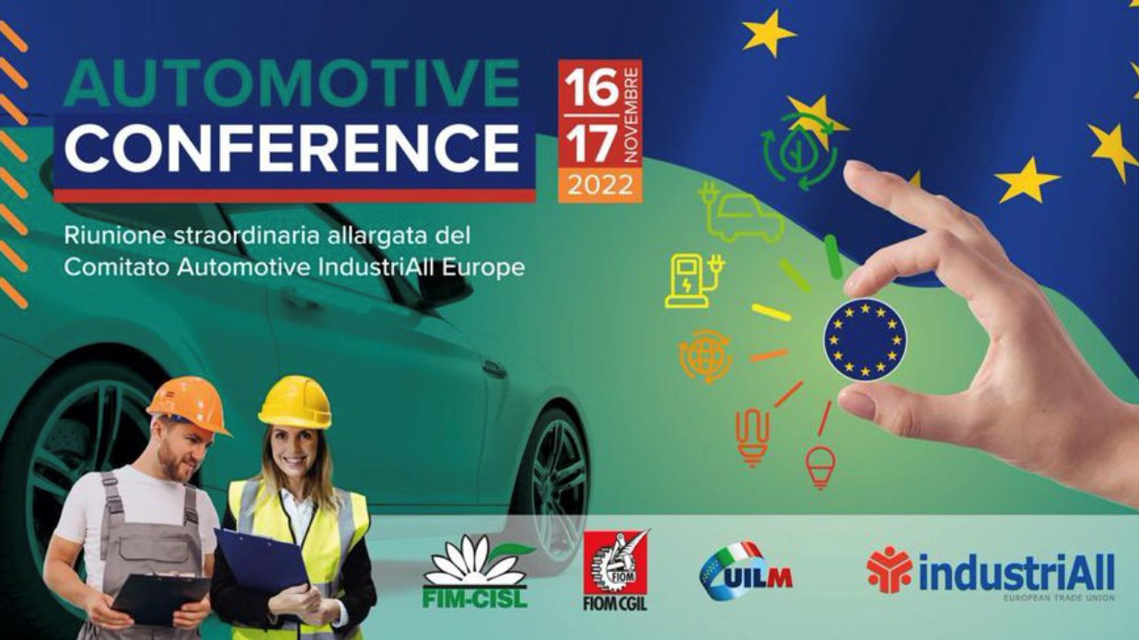We need an assertive European industrial strategy to transform the industry and create good jobs while decarbonising the sector. To achieve a Just Transition and keep workers on board, we also need negotiated plans to better anticipate change.
In several discussion sessions with external experts, MEPs, shop stewards and trade union officials, delegates debated the future of the European automotive industry in light of the twin – digital and green – transition and European decisions to halt the production of internal combustion engines (ICE) by 2035 at the latest.
The automotive industry accounts for 2.6 million manufacturing jobs in Europe and supports more than 13 million jobs overall. This makes it one of the most important industries for Europe and automotive-producing countries like Italy. We have a proud automotive history in Europe, but as one delegate stated, “the past cannot guarantee the future”.
Europe is facing a triple existential crisis. First, a social crisis, as high energy prices and related inflation destroy purchasing power and plunge millions of Europeans into precariousness and poverty. Second, an industrial crisis, as high energy prices also threaten the future of many activities in Europe and encourage the migration of investment towards regions where energy is cheaper than in Europe. Thirdly, extreme weather events remind us that the climate clock is ticking, and that Europe and the world must dramatically accelerate their efforts to reduce emissions and promote a circular economy.
The automotive industry, its supply chain and all workers involved, are at the frontline of these crises. Urgent action is needed to avoid Europe and Italy losing industrial leadership, which would be a social, economic and political disaster.
- Change is happening right now in workplaces across Europe – it is no longer on the horizon. The impact and challenges of the transition are already being felt by workers. Millions of jobs, often highly skilled quality jobs, are at stake. Given the massive and rapid transformation, the industry is undergoing, half a million jobs in the internal combustion engine (ICE) supply chain alone could be lost by 2035 (according to CLEPA’s figures).
- The EU Green Deal is accelerating this change. A shift in consumers choices and mobility patterns as well as new mobility policies at regional and local levels, are reinforcing the momentum. The current context of post-pandemic uncertainty with high inflation, volatile energy prices and supply disruption has entailed a stark decrease in sales volumes: -25% for new passenger car registrations in the EU from 2019 to 2021.
- Unions need to be united and vocal in pushing employers and governments to manage and anticipate structural change in a socially fair way. Certain conditions must be met for the transition to be successful. And since the ICE phasing-out is a political decision, politicians in particular have a moral duty to ensure that workers are not left to fend for themselves.
- We need an industrial strategy focused on decarbonisation and digitalisation to protect workers as their jobs transform and ensure that promises of a Just Transition become a reality. Every site (whether OEM or supplier) must have an industrial and social plan, with a European framework for Just Transition enshrined in EU legislation to avoid workers or regions being left behind.
- Industrial strategy should not mean defending the status quo, but rather creating the conditions for transforming existing plants, and attracting and developing manufacturing activities for the sustainable and affordable mobility we need to build together. We can and must produce batteries, electric vehicles, clean hydrogen, electrolysers, fuel cells and chips in Europe. These are the segments we need if we want Europe to master its transition and avoid greater import dependency.
- The approach must be based on technology neutrality. All the technologies that meet the climate neutrality requirement and are in line with the UN sustainable development goals should be part of the solution. We need to support the development of tomorrow’s mobility technologies through reinforced R&D and innovation policies.
Shop stewards from plants across Europe made it clear that all too often the rhetoric does not match the reality on the ground. Whilst OEMs and suppliers are undergoing massive and rapid changes, many important questions remain unanswered for workers regarding the impact of these changes on their employment and working conditions.
Worker participation is not always guaranteed. Social dialogue is not promoted and anticipation of change does not take place to avoid redundancies and brutal restructuring. Companies announce job cuts in the press without informing and consulting workers’ representatives beforehand. This is an unacceptable infringement of EU legislation on informing and consulting workers and undermines workers’ fundamental rights to have a say in decisions that affect their fate. This is of course primarily the responsibility of companies, but it is also the responsibility of the EU and its member states to enforce existing EU law to protect workers’ rights.
Strong industrial relations and social protection are as important in this transition as in any restructuring, but the pace and scale of the change means that they are now indispensable in our sector.
Speaking in Rome, Luc Triangle, General Secretary of industriAll Europe stated:
"The automotive industry is currently undergoing an unprecedented transformation – an industrial revolution. Electrification and automation will massively destroy jobs and put workers under extreme pressure if we leave this to the market alone. We need an assertive European industrial strategy to transform the industry and create good jobs while decarbonising the sector. We need investment to transform existing plants and develop the supply chains needed to produce vehicles in Europe, in time for the climate emergency. To achieve a Just Transition and keep workers on board, we also need negotiated plans to better anticipate change. EU policy is currently too weak on Just Transition to ensure that the Green Deal is socially fair – this must change urgently!"


